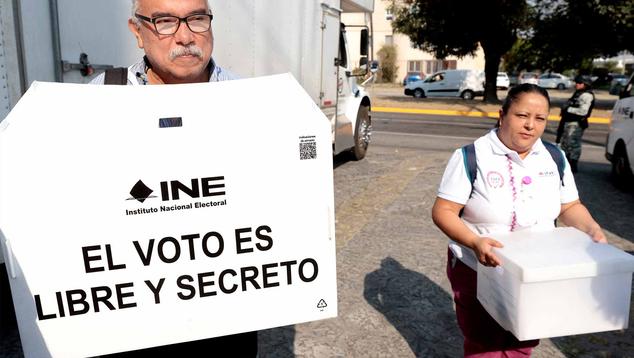LONDON -- Millions in Mexico head to the polls on Sunday to choose President Andres Manuel Lopez Obrador’s successor. Both top candidates are women, so the country is almost certain to elect its first female president. Obrador’s protege, Claudia Sheinbaum, holds a commanding poll lead over her nearest rivals.
Leading up to the election, life is looking up for many in Mexico. Perceptions of the economy, leadership, institutions and the honesty of elections are buoyant. But questions hang over long-standing security challenges and Mexico’s relationship with global powers. Here are five things to know ahead of the vote.
1. Economic Optimism Reaches Record High
The economy is a perennial issue in elections around the world. Last year, people in Mexico felt more optimistic about their improving living standards (73% “getting better”) and local economy (57% “getting better”) than at any time since Gallup began surveying the country annually almost two decades ago.
For the first time on record, a majority (55%) had confidence in Mexico’s financial institutions and banks. The Mexican economy performed relatively well in 2023 and is expected to see higher-than-average growth in 2024 -- driven by a drop in inflation and a slowdown in energy prices.
In a wider context, Mexico felt more positive about its economic future in 2023 than almost any other advanced economy. It tied Costa Rica for first place among OECD (Organisation for Economic Co-operation and Development) countries on the belief that living standards are getting better and was second only to Denmark (61%) on the belief that local economic conditions are improving.
2. Rising Faith in State, Leaders and Institutions
Mexico’s positive mood is not limited to the economy. In 2023, majorities also approved of their country’s leadership (53%) and had confidence in their national government (61%) -- both record highs. When Obrador came to power in December 2018, shortly after Gallup surveyed Mexico that year, just 29% had faith in their national government. Over Obrador’s time in office, confidence in his government has doubled. In 2023, confidence in the national government was twice as high in Mexico as it was in the U.S. (30%).
Obrador has seen his personal job approval rating vault to 80% from 67% in 2022, making him one of the most well-liked leaders in the world. Again, since Gallup began surveying Mexico in 2006, no other leader of the country has seen such high approval ratings.
In all likelihood, Mexico will elect its first-ever female president this year, with Sheinbaum and Xochitl Galvez as the two main candidates. But despite this marker of progress, Mexico remains a tough place for women. Thirty-six percent of women in Mexico (and 43% of men) feel women in their country are treated with respect. Only Türkiye (28%) and Colombia (22%) score lower among countries in the OECD.
3. Confidence in Elections Reaches Record High, but Still a Minority
Like many other countries in Latin America, Mexico has historically had low levels of faith in its electoral integrity. Between 2015 and 2017, confidence in the honesty of Mexico’s elections averaged just 19%. Since then, however, confidence has risen gradually, reaching 44% last year.
Although this is the highest point on record since Gallup started surveying Mexico in 2006, those who are confident in honest elections remain a minority. More than half of adults in Mexico (55%) continue to lack faith in the process.
4. Long-Standing Public Safety Challenges Remain
While perceptions of the economy, leadership, institutions and the honesty of elections all improved significantly in 2023, one issue that remained unchanged was that of public safety. For much of the past decade, a majority of people have felt unsafe walking alone in their area at night, staying at 54% in 2023.
Public safety and insecurity have formed a core part of the electoral campaign, especially as over two dozen candidates have been killed in the lead-up to the election. Opposition candidate Galvez has pledged to take a hard line on crime and build a new state-of-the-art, high-security prison reminiscent of one recently built in El Salvador.
Obrador has tasked the armed forces with addressing violence and insecurity. In contrast, Sheinbaum plans to reduce the military’s power, instead giving more power and resources to the police -- which people have less confidence in than the military (44% vs. 71%, respectively).
5. An Uncertain Place on the World Stage?
Regardless of who becomes Mexico’s next president, they will have to navigate complex relationships on the global stage. Mexico recently became the United States’ largest trading partner, overtaking China. Recent international efforts have aimed to strengthen ties with Beijing, but Mexico has also been criticized for its hesitancy in bringing sanctions against Russia after the invasion of Ukraine.
Last year, none of these global powers was viewed particularly positively in Mexico. Just below a third approved of U.S. leadership, broadly in line with approval ratings of China (29%) and Germany (28%). People were more likely to disapprove of Washington’s leadership than Beijing’s or Berlin’s because of greater familiarity with the U.S.; significantly more offered no opinion about China and Germany. Moscow is viewed least favorably, with three times as many disapproving as approving (60% vs. 20%) of Russia’s leadership.
Bottom Line
The coming election in Mexico will be historic for many reasons. Not only will it be the country’s biggest-ever vote and likely the first to elect a woman to the highest office in the land, but it is also taking place amid record-high levels of positivity in public opinion.
While buoyant perceptions of the economy, leadership, institutions and the honesty of elections point to a positive future for many, Mexico is not without its structural challenges. Addressing insecurity, crime and gender inequality will also likely define the success of Mexico’s new leader, whomever that may be.
To stay up to date with the latest Gallup News insights and updates, follow us on X.
For complete methodology and specific survey dates, please review Gallup's Country Data Set details.
Learn more about how the Gallup World Poll works.




